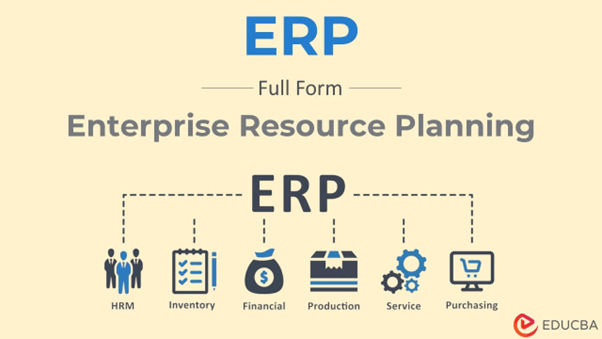Updated February 8, 2023
What is the Full Form of ERP?
Enterprise Resource Planning, recognized as the full form of ERP, aims to consolidate all organizational departments and tasks into a single computer system that meets the specific needs of each department. The needs of the finance department, the human resources department, and the warehouse are all met by a single software program based on a single database.
ERP software collects data to analyze and transform it into valuable information later used by enterprises to make business choices.
Types Of ERP Deployment
The ERP systems are of three types: They are as follows:
#1 Cloud ERP
- Cloud ERP is an (ERP) system that runs on the cloud platform of a provider.
- When you use cloud ERP, it is offered online as a subscription.
- The software handles regular maintenance, updates, and security on your behalf.
- Due to lower initial costs, increased agility and scalability, simple integration, and many other factors, cloud ERP is currently the most preferred deployment approach.
#2 On-Premise ERP
- On-premise ERP refers to systems deployed and operated internally by user companies on their servers.
- With On-Premise ERP, you no longer rely on a vendor and have complete control over the system.
- The ERP software is in a data center of your choice.
- Your team is in charge of installing and maintaining the hardware and software.
#3 Hybrid ERP
- A hybrid ERP system combines on-premise and cloud-based ERP technologies.
- With hybrid ERP, businesses can select from a wide range of cloud ERP solutions that include the capabilities they demand, allowing them to innovate and quickly fulfill local requirements.
- Costs are reduced by utilizing the hybrid ERP system because purchasing a separate cloud ERP system for business groups is more expensive than extending a single ERP system across all areas of the organization.
Benefits of ERP
There are numerous direct and indirect benefits of installing an ERP system. Some of the benefits of ERP are listed below.
#1 Business Integration
- The first and most significant benefit of deploying ERP is integration.
- When a transaction takes place, the data of relevant business operations are automatically updated.
- Real-time business information enables the understanding of the process and uses it to make various management decisions.
#2 Versatility
- The versatility of ERP inside business functions is its second advantage.
- One system can accommodate several languages, currencies, accounting systems, and more.
- It is possible to assemble and automatically execute operations that handle various sites.
#3 Better Analysis And Planning Capabilities
- The enhancement of planning capabilities is another benefit.
- Thanks to the facilitation of comprehensive and unified administration of a linked business and its data, it is now possible to fully employ a variety of decision-making, support systems, and simulation capabilities.
- Giving decision-makers the required information allows them to make better and more informed judgments which can be made possible by the ability to fill out and analyze data from a range of dimensions in real time and with flexibility.
#4 Use Of The Latest Technology
- ERP quickly develops the most recent technologies, including open systems, client/server technology, internet/intranet, electronic/commerce, etc.
- Businesses can choose from various cloud ERP options that will enable them to innovate and swiftly meet their needs.
- It ensures that all corporate data is aggregated into a single database, making it readily available to the users.
#5 Cost Effective
- ERP systems reduce the administrative cost by reducing paperwork and optimizing everyday routines, most notably by reducing repeated jobs
- Furthermore, resource planning solutions significantly accelerate corporate activities such as stock, supply, logistics, etc., requiring several approvals and requests.
#6 Better Customer Service
- Another practical advantage of ERP software is improved client relationship management. A centralized data storage system collects all relevant sales-related information, making it simple for sales representatives and customer care employees to engage with clients and respond to consumer requests within a short period of time.
- Faster access to client records with improved accuracy complements the other advantages described above. For example, carefully acquired and processed data on consumer behavior patterns may result in strategy refinements or a more exact estimate of consumption on time.
Conclusion – Full Form of ERP
To summarize, ERP is distinct. The distinguishing factor of an ERP system is its ability to optimize all business operations. ERP technologies are expected to evolve and change to meet company objectives and change in market situations. Organizations with access to these new technologies can swiftly improve their business practices as the ERP software advances. They can automate operations that would otherwise require extensive manual involvement. Moreover, the global ERP market revenue might increase by $47 billion over the next five years. ERPs will become a top focus for commercial organizations. So, if you are in business, you must have an ERP system.

